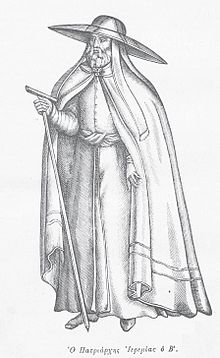Jeremias II
| Jeremias II Tranos | |
|---|---|
| Ecumenical Patriarch of Constantinople | |
 |
|
| Church | Church of Constantinople |
| In office | 5 May 1572 – 23 Nov 1579 Aug 1580 – 22 Febr 1584 Apr 1587 – Sept 1595 |
| Predecessor |
Metrophanes III Metrophanes III Theoleptus II |
| Successor |
Metrophanes III Pachomius II Matthew II |
| Orders | |
| Consecration | c. 1568 |
| Personal details | |
| Born | c. 1530 Anchialos |
| Died | 1595 Constantinople |
| Previous post | Bishop of Larissa |
Jeremias II Tranos (c.1530 – September 1595) was Ecumenical Patriarch of Constantinople three times between 1572 and 1595.
Jeremias Tranos was born in Anchialos, from an influential Greek family. The exact date of birth is not known, most probably 1530, but some scholars suggest 1536. He studied with the best Greek teachers of his age, and in his youth he became a monk. Supported by the rich Michael Cantacuzene, he was appointed bishop of Larissa on about 1568.
When Cantacuzene obtained the deposition of Patriarch Metrophanes III, Jeremias, supported by Cantacuzene, was elected for the first time to the Patriarchate on 5 May 1572. Jeremias' first concern was the reform of the his Church, and he summoned a synod with the aim to root out the simony. He also made restored his cathedral, that at the time was the Pammakaristos Church. During this his first reign Jeremias also had the first contacts with the Lutherans which ended in a deadlocked disagreement. On 3 March 1578 his patron, Cantacuzene was executed, and so Jeremias position became weak. On 23 (or 29) November 1579 Jeremias was deposed and excommunicated, and his rival Metrophanes III returned on the Patriarchal throne.
Metrophanes III died in August 1580, and Jeremias returned for the second time on the throne, probably on 13 August. From 1580 to 1583 there were contacts between Jeremias and envoys of the pope in regard to the introduction in Greece of the Gregorian calendar: Rome was almost sure about a positive solution, but on the contrary the final position of Jeremias was negative. In 1584 Jeremias offered as a gift to Pope Gregory XIII two pieces of relics from the bodies of Saint John Chrysostom and Saint Andrew of Crete.
...
Wikipedia
